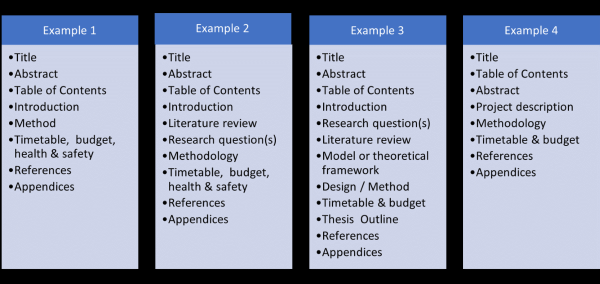Writing a research proposal

Writing a research proposal, whether it is for a thesis or dissertation, a course assessment or a funded project, is an essential step in any research project. Writing a research proposal can be particularly challenging because proposals tend not to be public documents, so you may not have seen an example. Also, proposals are written for a variety of purposes and audiences, so there is more than one acceptable format.
This guide provides an introduction to writing a proposal, to help you make some decisions about the type of proposal you need to produce.
Why write a research proposal at all?
A research proposal is an essential step in any research project. It helps you as a researcher to:
- Clarify your ideas by reflecting on and refining your proposed research project
- Plan by creating a guide and a way of monitoring progress during the research
- Write early to develop good writing habits (and to start writing some parts of your final report)
- Communicate your proposed research so others can give you feedback.
What is the reader looking for in your proposal?
Your research proposal helps your supervisor and faculty (and sometimes a funding body) to:
- Assess the worth of the proposed research
- Assess your capacity to complete the research
- Assess the institution’s capacity to support the research.
The proposal must convince the reader that the research is worthwhile and that the research is feasible.
Ensure your proposal provides answers to questions such as these:
- Is this problem or issue worth studying?
- Are the questions/objectives/hypotheses clear?
- Will the study contribute significantly to our knowledge of the issue?
- Will the expected research outcome meet the requirements of the degree?
- Is the researcher aware of the key schools of thought relevant to the study?
- Has the researcher critically engaged with the literature and used the literature to justify the research?
- Is the methodology appropriate?
- Does the researcher have the necessary skills to complete to project successfully (or is further training required?)
- Are the required budget and resources, including supervision, available?
- Have potential risks been identified and managed?
- Is the timeline feasible?
Developing the structure of your research proposal.
The proposal should include three key elements:
- What you intend to do
- Why you intend to do it
- How you intend to do it.
The exact format for the proposal varies amongst faculties; your faculty will have specific guidelines and/or a template, and may have example proposals.
Regardless of the format, most research proposals follow a similar pattern.
The preliminary sections will have a title page, an abstract, an optional table of contents and perhaps a glossary or other useful preparatory information.
This section will contain the research problem and the rationale for the study. There will be a discussion/literature review that provides context (ie literature and theory relevant to the study) and a justification for your research question. You will also find the objective(s), or research question(s), or hypothesis(es) as well as the significance or expected contribution of the study, along with the scope and/or limitations of the research area.
The Methodology is a description of, and rationale for, the methodology, design, and methods you use, as well as Data analysis, which includes a description of, and rationale for, the proposed method of data analysis.
In this section, outline any ethical considerations, if appropriate and the potential risks or problems and how they would be addressed. You should also include details of the research programme such as the time frame, budget, resources and any health and safety considerations.
This area should contain any references and perhaps appendices.
Sample proposal outlines

Tips from proposal writers
- Don’t forget to find out about the different requirements for each degree – check the House Rules and discuss with your supervisor.
- Start writing early – it forces you to clearly articulate your ideas and helps you get good writing habits.
- Get feedback from a variety of people. This helps you stay ‘on track’ and improve your writing skills.
- Read widely and talk to others.
- Spend as much times as you need on the proposal – it will definitely pay off later.
- Ask other research students who are one or two years ahead of you for advice on timelines (eg how long might it take you to analyse data or to write a chapter?)
- To find out more about writing a proposal, you could start with Lincoln University Honours, Masters and PhD House Rules.
- Or attend workshops or appointments offered by the Learning Advisors.
Get Individual Advice
Talk to a learning advisor or attend one of our workshops for help with your study.


